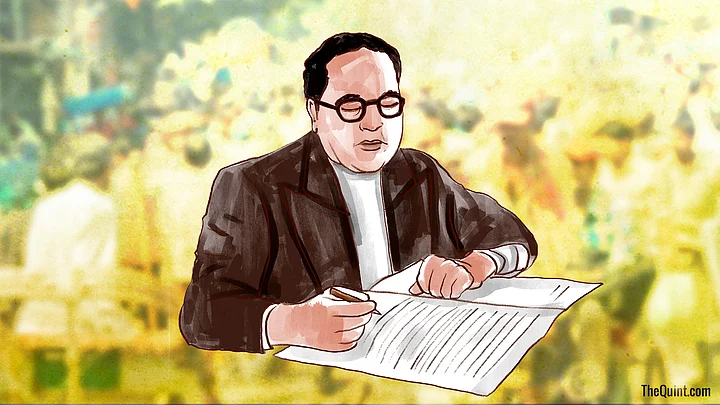(This article was first published on 23 September 2017 and is being republished from the archives on the occasion of Dr BR Ambedkar's death anniversary on 6 December.)
My five years of staying in Europe and America had completely wiped out of my mind any consciousness that I was an untouchable, and that an untouchable wherever he went in India was a problem to himself and to others.BR Ambedkar, Waiting For A Visa (1935-36)
The year was 1917, and 26-year-old BR Ambedkar stepped out on a railway platform in Baroda (now Vadodara), Gujarat, to serve as a Probationer in the Accountant General’s office.
The three years before his short stay in Baroda were spent at Columbia University (1913-16) in the company of education reformist Professor John Dewey, whose work on democracy shaped Ambedkar’s intellectual life. Later, he embarked for London School of Economics (1917) to begin work on his doctoral thesis.
While life in foreign land was a revelation, here in Baroda, he stood wondering if he’ll be able find a roof over his head for the night or for the days to come.
Following his harrowing experience during his short stint in Baroda, he took the ‘Mahasankalp’ or ‘great resolution’ of resolving to change the way Dalits were treated in India.
Now, Bahujan Samaj Party supremo Mayawati is set to mark ‘Mahasankalp Diwas’, 100 years since Ambedkar launched it, with a rally on 23 September in Vadodara’s Navlakhi Maidan. The party chief’s visit to Gujarat can be viewed as an aggressive political posturing ahead of the Gujarat Assembly polls this year and an attempt to regain the support of Dalits.
‘Will They Let an Untouchable Stay?’
Ambedkar found a Parsi inn that did not provide accommodation to non-Parsis. He somehow convinced the caretaker to let him stay under a Parsi alias. The stay, however, wasn’t very welcoming.
What added to Ambedkar’s exasperation was the discrimination he faced at his workplace.
Author Mahesh Ambedkar in his book, The Architect of Modern India: BR Ambedkar, mentions incidents where peons would refuse to serve Ambedkar water and throw files at his table from a distance so as to avoid touching him. Even his co-workers objected to his presence and would not even make eye contact with him.
This, of course, inflicted damage to his self-worth and at the same time made him stare at the plight of lakhs of untouchables in the country that was still reeling under the British rule.
Honouring his commitment to the erstwhile Maharaja of Baroda, who had funded his education abroad, he went on with his duties, when on the 11th day of his stay at the Parsi inn, he was confronted by “sturdy Parsis armed with sticks”.
His cover was blown.
He was warned of “dire consequences” if he didn’t pack up and leave by evening.
He sought his friends’ help, but to no avail. With no other option left, he decided to return to Bombay the same day. With five hours to go before the train departed, he gathered his luggage and spent the rest of the evening at a public park – Kamathi Baug or Sayaji Baug – completely distraught.
In Dr Ambedkar: Life and Mission, Dhananjay Keer narrates how a young Ambedkar, while writing to his father’s friend during his stay in the US, had quoted the “immortal lines of Shakespeare impressing upon his mind to seize every opportunity to further the cause of the community”.
The lines read:
There is a tide in the affairs of men, Which taken at the flood, leads on to fortune.
These words that Ambedkar had once scribbled must’ve reverberated through his mind in those five harrowing hours. The thought that ‘Janma’ or birth cannot mould an individual’s destiny must’ve reigned supreme in this mind after being repeatedly belittled.
After his return to Bombay, he headed to Calcutta to meet Annie Besant, who was then the President of Indian National Congress, to apprise her of the plight of the Depressed Classes in the country. Following this, the INC, for the first time in 1917, adopted a resolution endorsing “the justice and righteousness of removing all disabilities imposed by custom upon the Depressed Classes.”
Mayawati, on this day, seems to be reinforcing the party’s association with Ambedkar’s ideology and show her political rivals her preparation for 2019 general assembly polls.
